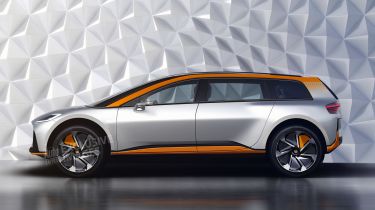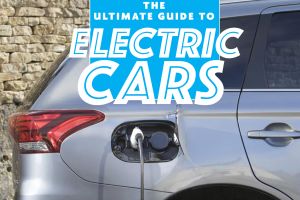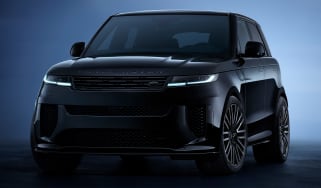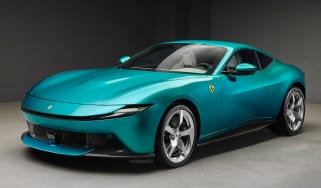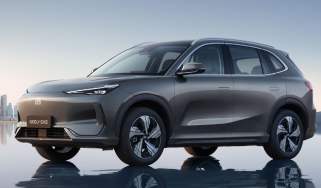Dyson car: Dyson repay £8m Government grant for dead electric car project
Dyson have repaid a Government grant worth millions of pounds after it mothballed its electric car project last October
Sir James Dyson: Q and A (summer 2017)
When did you first get interested in cars?
Back in the late eighties. At that time I was about to launch a cyclonic vacuum and I knew a cyclone could collect diesel exhaust particulates. So I started developing a cyclonic separation unit to collect diesel exhaust particulates. We were testing a cyclonic exhaust filter by 1993. But I didn’t let go of it, so we put a team on it.
As it turned out, the cyclone couldn’t collect fine enough particulates but we went on developing it through to 1998. That year we approached truck, diesel and exhaust manufacturers to try to put pressure on them to fit our diesel exhaust systems to cars, trucks and buses. But the response was that there was a big problem disposing of the soot. Plus at the time, the press were still very keen on promoting diesel as clean - and car manufacturers said they’d fit ceramic filter traps, which to me are a bit like vacuum cleaner bags. They clog up and then you have to burn off the soot, which is a dubious process anyway.
By then I was pretty fed up with the whole thing. I decided to start developing electric motors and batteries, and environmental control technology, because I could see at that stage - the late nineties - that we needed electric cars. I wasn’t in a position to do that then, though, because the batteries weren’t sufficiently developed. And the world didn’t want it at that point either.
But you haven’t really stopped?
No. Over past almost 20 years I’ve been developing new battery technology and new electric motors. Our digital motors are the fastest production electric motors in the world. A few years ago we bought Sakti3 which has some very interesting solid-state battery technology. But we’re also developing other forms of solid-state batteries.
We now have two internal developments that are, if you like, competing with each other. We may use one in our [next generation of] vacuum application and one in the car application, or we may use just one. But internally, at the moment, we’re backing two.
So how did you get to the point where you’ve made the decision to build a car?
I’ve been developing these technologies consistently because I could see that one day we could do a car. We could do a car when we had really interesting battery technology that was better than other people’s - that moved beyond the problems of liquid lithium-ion batteries - a really efficient electric motor, really efficient air purification and treatment, and a really efficient, aerodynamic car.
So two and a half years ago we started developing an car. We have more than 400 engineers working on an electric car. And we’re still building the team; it’s getting bigger and bigger.
We’ve recently bought this airfield, called Hullavington Airfield, and that will be where we develop our car. We’re moving in in February. We’re doing up a couple of the 1934 hangars, and we’ve nearly finished. It’s a great place - an old World War II airfield. At the end of WW2 it had over 1,000 planes on it, of every type.
The picture I’m trying to create is that we’re not a Johnny-come-lately to the scene of electric cars. It’s been my ambition since 1998, when I was rejected by the industry, which has happily gone on creating polluting diesel and petrol engines, and governments have gone on allowing it. So it’s been an ambition of mine from almost 19 years ago to come up with an all-electric car. It wasn’t a very fashionable thought in 1998; it wasn’t a very fashionable thought even three years ago. But it’s suddenly become so.
We make 100 million battery cells a year for vacuum cleaners. We’re already a very large manufacturer of batteries. I’m told that that’s something like six percent of the world’s rechargeable battery market.
How much is this costing?
I will invest one billion sterling in the car and one billion sterling in the battery technology, including production facilities, plus half a billion sterling in our other products [vacuums and robotics]. We hope to bring out an all-electric car in 2020.
Why are you going public on this now?
That’s a good question. The answer is that the Treasury had already announced it! But also because it was making it difficult to talk to sub-contractors; it was holding up dealing with that side. And finally recruitment; you can’t say what people are going to do. We want to talk to governments and as we’ve discovered, governments are leaky. So we thought it was better to announce it on our own terms. Plus we’re recruiting the best engineers and scientists; that’s key to what we do at Dyson.
Can you give us an idea of what we can expect from the car itself? Will it be an urban mobility vehicle or something with a wider breadth of abilities than that?
I’m not going to tell you what it is, but it’s not a sports car and it’s not a very cheap car. It’s about technology and using technology in an interesting way. We’re not going for the Leaf end [of the market].
But when it comes out, do you expect it to look very different from what we’ve seen before, in the same way that a Dyson vacuum cleaner looked very different from what we’d seen before?
Yes. There’s no point in doing one that looks like everybody else’s. We’re not in that sort of business. We’re trying to be radical, but you’ll have to wait and see.
You’re obviously not going to give us a figure now but given your battery technology, do you think you’re going to be able to get a range out of your electric car that exceeds what’s on the market?
Well that’s where the battle is. And yes, being efficient and having a good range is important.
2020 isn’t far away. Do you have running prototypes already?
No. We don’t have an existing chassis yet, and what we’re doing is quite radical so there’s not an existing chassis that we can use. We’re starting from scratch.
A lot of car companies spread massive development costs across a range of vehicles. Are you only making one car or is this your first entry and there’s a whole potential model line-up to follow?
Exactly that. Getting into doing a new-technology car is different, and the cars should be different, because they can’t be built like internal combustion-engined cars. But the up-front investment in the body-in-white is a huge investment. Over the years, we’d hope to get payback on that initial investment in the body-in-white so, yes, we hope to have a range of cars.
Where will you build the car?
We don’t know where we’re going to make it. We’ll make it wherever it’s best to make it. An all-electric car with this technology is very different from a normal combustion-engined car. Wherever we’ll make the battery, we’ll make the car; that’s logical because they’re big, heavy things to move around. We want to be near our suppliers; we want to be in a place that’s friendly to us, and which welcomes us. So it’s where it’s logistically most sensible. We see a very large market for this car in the Far East.
Again, though, 2020 is not far away. You must have to make decision on this soon?
We’re looking at the next few months for a decision on where the factory is.
Do you have a shortlist? And is the UK on it?
There are front-runners. And the UK would always be a front-runner. But we want to be near where are our markets are. And the Far East has reacted more quickly to wanting electric cars than Europe has.
Would that be at the same site where you’re doing the development - the new facility at Hullavington - or would it be somewhere else?
It would have to be there.
Do you have an emotional attachment to having at least some of the production in the UK or are you being purely business-like about it?
I have to be business-like. I’m putting two billion pounds of my own money into it. Although we don’t manufacture the vacuum cleaners in England, I already employ 4,000 people developing them in England. So at the very least, we’ll develop it here. We’ll have the know-how here and create a lot of jobs - and they’re high-value jobs, by the way.
You say the car will be powered by solid-state batteries. Can you give us an idea of why these are better than the batteries currently in electric cars?
Solid-state batteries have no liquid chemical so they’re much safer. They don’t heat up. You can charge them quicker. They’re better for recycling and if you do it correctly, you can make them much more dense and powerful than even the future proposed lithium-ion batteries.
Have you looked at the charging infrastructure? Because that’s one of the big flaws at the moment - in this country and lots of other countries. Would you have your own charger or will you look to use universal chargers?
Well, I think by then chargers will be universal. But what we’d like to see is the government putting three-phase charging into people’s homes. Really you need 21kW charger in people’s homes, not a 13A charger. I want people to be able to charge at home and not spend an hour at a petrol station.
Charging is a big issue, though. Tesla went its own way and created a Supercharger network. Are you not even considering or looking at something similar?
I haven’t got the money, to be honest! Tesla’s received five billion in government aid or something like that, and a huge amount of investors’ money. I don’t have that. I’ll tell you what I am doing, though; I’ve built two anaerobic digesters in Lincolnshire, and I supply six megawatts, 24 hours per day, seven days per week, into the National Grid, to power 10,000 homes. And I hope to do a bit more of that.
Have you even considered partnering with an established manufacturer on this project?
That’s not the way we do things. We want to do it ourselves and control it ourselves.
Is that because they didn’t support your earlier efforts with the cyclonic exhaust system?
I’m not being as strict as that on other manufacturers but I was very disappointed that none of them solved this problem until bad publicity about diesel engines forced them to. I didn’t see what an existing manufacturer could offer us. We didn’t have even exploratory talks with existing manufacturers.
Your company has conducted a lot of research into vision systems, including the 360-degree vision that’s fitted to your robotic vacuum cleaners. Could they support autonomous technologies?
I think they call it driver assist. I think that total hands-off driving is still some way off. But there are lots of interesting things that can be done through vision systems. It’s what’s called Level Two, not Level Three yet. There’s lots of other things besides the actual driving that vision systems can do for you.
Can you make profit doing this?
I hope so. That’s the idea. Yes, I think we can. We know it’s a crowded market. But if you produce a product that has technology that’s genuinely better, a product people want, then you can make money. The vacuum cleaner market was crowded when we entered it.
Have you thought about your route to market? The car industry is seeing a lot of movement towards subscription models, for example.
We don’t know yet but that would certainly be a model. And we’re moving to be much more direct with the other things we sell. We’re certainly considering rental and other forms of purchasing.
How many cars do you envisage selling?
We want to sell lots! We never make predictions, because our idea is to put in new technology and develop a car that we think is attractive to people. But I can’t predict how many people will buy it.
The 2020 date; is that when the car will be available to buy, or is that when you hope to have a working model?
We hope to be ideally ready to deliver in 2020 but more realistically it’ll be early 2021. And we’d love to take orders from now on.
How big a deposit would I need if I wanted to do that?
I haven’t thought about it except in the past 10 minutes, because it’s some way off yet. But maybe we should start thinking about it.
Will a Dyson electric car be a success? Let us know in the comments below...
Find a car with the experts
